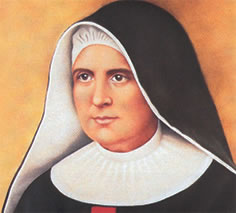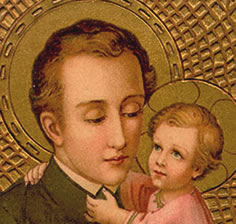November Saints
 Blessed Josephine Vanini (1859-1911)
Blessed Josephine Vanini (1859-1911)
Blessed Josephine Vannini was born in Rome, Italy, in 1859, one of three children of Angelo and Annunziata Papi Vannini. The family, devout and happy, faced tragedy between 1863 and 1866 when both parents died. The children were separated, and Josephine was given to the care of the Daughters of Charity of St Vincent de Paul. Inspired by these religious, Josephine wanted to enter the convent, a desire she maintained steadfastly even when reunited with her brother and sister in 1880.
Josephine duly entered the Daughters of Charity, but became ill and spent time in another convent recuperating. While on retreat in 1891 she met Father Luigi Tezza, procurator general of the Camillians. For some time he had been thinking of founding a women’s community which would be consecrated to God for the care of the sick. Moved by divine grace, he invited her to join him in establishing this new community. Josephine thought about it, prayed and sought advice. Then, in characteristic fashion, she gave him a decisive “Yes.”
In 1892 Josephine and two companions received the scapular of Camillian tertiaries. One year later they professed private vows, adding a fourth vow of service to the sick, even at the risk of their own lives. They made their perpetual profession as Daughters of St Camillus in 1895 and Josephine was elected Superior General.
The year 1900 saw Father Tezza sent to Lima, so responsibility for the new congregation rested in the hands of Mother Vannini, who was never one to shirk such a task. Her life thereafter was summed up by Pope John Paul II: “To serve the suffering; this was her special charism. To belong totally to God who is loved and honoured in the needy, was her constant concern, expressed in a daily, boundless charity towards the infirm, in the footsteps of the great apostle, St Camillus de Lellis.”
Under Josephine’s guidance, the Daughters of St Camillus opened houses in Italy, France, Belgium and Argentina. She died in 1911 in Rome. The Holy Father lauded her in the following words: “How contemporary are her witness and message! Mother Vannini makes a strong appeal to today’s young men and women who sometimes hesitate to make total and definitive commitments. She invites all who are called to the consecrated life to respond generously, as she does all who fulfil their vocation in family life: God has a plan of holiness for everyone.”
Blessed Josephine, show us how to care for Jesus in the sick.
(Source: Internet – various)
 Saint Stanislaus Kostka
Saint Stanislaus Kostka
(1550-1568)
Stanislaus was born in Rostokovo, Poland to a noble family. In 1563 he was sent to study at the Jesuit college which had recently been established in Vienna, Austria. There he came under the influence of Saint Peter Canisius, who encouraged him to journey to Rome and enter the Society of Jesus. In the face of angry opposition from his family, he joined the Jesuit novitiate in 1567, under Saint Francis Borgia.
Stanislaus was more than a model novice, but before the year was out, he died on 15 August 1568. He was indeed “made perfect in a short while and fulfilled many times by the angelic innocence of his life.”
Saint Stanislaus, teach us the beauty of innocence.
(Source: A New Dictionary of the Saints, Donald Attwater. 1993 Burns & Oates, Kent)
 Saint Cecilia
Saint Cecilia
(d. 2nd-3rd century)
Cecilia was one of the most famous virgin martyrs. She was a member of a patrician family, married against her will to a pagan noble named Valerianus, who was convinced to respect her virginity and to become a Christian. Valerianus and Cecilia’s brother Tiburtius were arrested for burying the bodies of martyrs. They were beheaded in Rome.
While burying the three martyrs, Cecilia was arrested and tried by Almachius, the prefect, who condemned her to death. Cecilia was to be smothered to death, but when this was miraculously prevented, she was sentenced to beheading. The soldier assigned to this task bungled the execution, and Cecilia lived three days before dying from her wounds.
Cecilia is the patroness of musicians, and societies bearing her name were founded to promote church music. This patronage is attributed to the legend that on her wedding night Cecilia did not hear the secular music but sang to the Lord in her heart.
Saint Cecilia, give us courage to profess our faith.
(Encyclopedia of the Saints, Matthew, Margaret & Stephen Bunson.1998 Our Sunday Visitor Publishing, Indiana)
 Entries(RSS)
Entries(RSS)